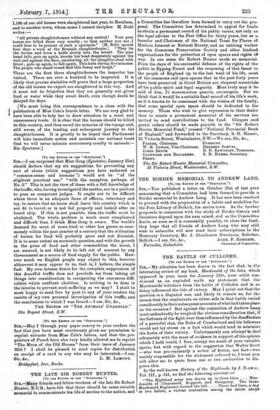!To ens Eamon or as “firsoraros.'1 Snt,—I am surprised that
Miss Greg (Spectator, January 31st) should declare that my six suggestions for preventing any sort of abuse (which suggestions you have endorsed as "common-sense and humane ") would not be "of the slightest practical use," "with the exception, perhaps, of No. 3." This is not the view of those with a full knowledge of the traffic, who, having investigated the matter, are in a position to pose as competent judges. It ought not to be difficult where there is an adequate force of officers, veterinary and lay, to ensure that no horse shall leave this country which is not fit to travel, or is not fed properly and looked after on board ship. If this is not possible, then the traffic most be abolished. The whole problem is much more complicated and difficult than It think Miss Greg is aware. The world's demand for meat of some kind or other has grown so enor- mously within the past quarter of a century that the utilization of horses for food will probably grow and not diminish. It is to some extent an economic question, and with the growth in the price of food and other commodities the horse, I am assured, is not likely to be left out of account by any Government as a source of food supply for the public. How- ever much we English people may object to this, however abhorrent it may appear to us, that is, I believe, the simple fact. My own intense desire for the complete suppression of this dreadful traffic does not preclude use from taking all things into consideration in recognizing the enormous diffi- culties which confront abolition. Is nothing to be done in the interim to prevent such suffering as we may P I shall be moat happy to send free by poet to any of your readers the results of my own personal investigation of this traffic, and the conclusions to which I was forced.—I am, Sir, &c.,










































 Previous page
Previous page